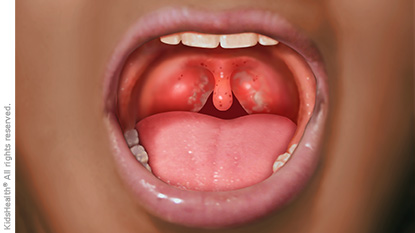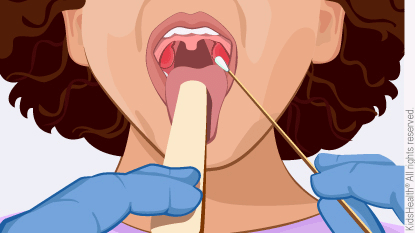Strep Test: Rapid
What’s a Rapid Strep Test?
A rapid strep test involves a quick throat swab. Within minutes, the test can detect group A streptococcus bacteria, which can cause strep throat and other infections (including scarlet fever, abscesses, and pneumonia).
Explaining the test in terms your child can understand might help ease any fear. During the test, encourage your child to relax and stay still so the health care provider can easily swab the throat and tonsils.
What Is Strep Throat?
Strep throat is a bacterial infection that affects the back of the throat and the tonsils, which become irritated and swollen. It causes a sore throat that’s especially painful when swallowing. Your child may get white or yellow spots, or a coating on the throat and tonsils, and the
lymph nodes
in the neck may swell and become tender to touch.

Why Is a Rapid Strep Test Done?
The rapid strep test is done to help quickly see whether a child’s sore throat is caused by a strep infection vs. other germs (usually viruses) that don’t need antibiotic treatment.
Health care providers may do a rapid strep test if a child:
- has symptoms of a strep throat infection and doesn’t have symptoms typical of a viral infection
- has a sore throat and has been exposed to someone known to have a strep throat, or if there are many strep throat cases in the community
Sometimes, they do a throat culture instead of a rapid strep test. A throat culture is more accurate than a rapid strep test, but the results take longer (2–3 days) to come back.
How Can I Prepare My Child for a Rapid Strep Test?
Encourage your child to stay still during the procedure so the health care provider can collect a good sample for an accurate test. Be sure to tell them if your child has taken antibiotics recently, and don’t have your child use mouthwash before the test, as it may affect test results.
How Is a Rapid Strep Test Done?
Swabbing only takes a few seconds. A health care provider will have your child open their mouth as wide as possible. They’ll press your child’s tongue down with a flat stick (tongue depressor) to clearly examine the mouth and throat. Using a clean, soft cotton swab, they’ll lightly brush over the back of the throat, around the tonsils, and over any red or sore areas to collect a sample.
Sometimes, they use two swabs so the second swab can be sent for a throat culture if the rapid strep test results are negative. The secretions on the swab are then tested in the office or a lab.
You might want to hold a young child on your lap during the procedure to prevent them from moving around, which could make it harder to get a good sample.

What Should My Child Expect From a Rapid Strep Test?
Your child may feel like gagging when the swab touches the back of the throat. If your child’s throat is sore, the swabbing may briefly cause slight pain.
When Are the Results Ready From a Rapid Strep Test?
Test results are usually available in about 15 minutes. If the rapid strep test indicates a strep infection, the doctor will prescribe antibiotics. But some negative rapid strep test results are false (meaning someone actually has a strep throat infection even though the rapid strep results were negative). So, the health care provider might then do a throat culture to make sure the results are accurate.
What Are the Risks of a Rapid Strep Test?
Throat swabs can be uncomfortable, but there are no risks with a rapid strep test.
What If I Have Questions About the Rapid Strep Test?
If you have questions about the rapid strep test, speak with your doctor.
